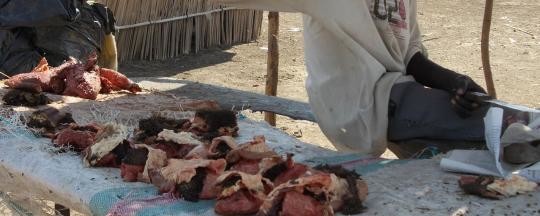Health workers are warning Abyei citizens to avoid eating too much meat, saying that this can cause problems such as high blood pressure. But some families insist that meat is essential to make any meal taste good.
Most people in Abyei eat meat at home and in restaurants – some because they enjoy it, and some because choices of food are very limited.
Every day, shoppers queue at a butcher in Aniet market in Agok to buy their meat. According to shopper Ayen Mangeth, a 27 year old from Juoljok, she ate meat every day as it was so nutritious.
But Kuol Mading Maluel, aged 34 and living in Agok, says he stopped eating meat in May when he was diagnosed with a condition where the body has too much of a waste product called ‘uric acid’.
Kuol said he had become vegetarian because eating meat made his condition worse – it left him fatigued and gave him headaches. He said he was cutting down his protein intake in the form of meat until he had recovered.
A doctor at Agok hospital, Mawien Michar Ajak, said too much meat in the diet could cause gout – a type of arthritis causing sudden pain in one or more joints. He also said eating a lot of meat could increase cholesterol levels, leading to an increased risk of problems such as heart attack and narrowing of the arteries.
James Majok, a nutrition officer in Abyei, said that meat was an important source of protein, but he stressed that a well-balanced diet was vital to avoid malnutrition, urging people to grow more vegetables for a healthy diet.
In related news, health officials in Abyei have also taken measures to improve the hygiene of meat, saying they will imprison slaughterhouse staff and butchers who ignore good hygiene practices when preparing meat.
This comes after complaints that raw meat is being washed in a dirty stream in Agok, bringing a risk of diseases like diarrhoea and cholera.
A 22-year-old student living in Mading Jokthiang, Daniel Angok, said he had spotted women washing meat in the stream.
A health inspector in Agok, Dr Deng Chol Bang, said dirty water could contaminate meat with toxins. He urged shoppers to report meat processors and sellers who practised poor hygiene, threatening to jail offenders.
Reporting by Abyei Today
File photo




